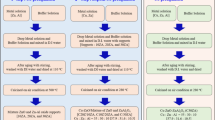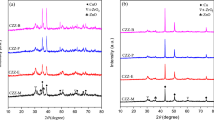Abstract
The effect of ZnO in Cu/ZnO catalysts prepared by the coprecipitation method has been studied using measurements of the surface area of Cu, the specific activity for the methanol synthesis by hydrogenation of CO2, and XRD. Although the Cu surface area increases with increasing ZnO content (0–50 wt%) as is generally known, the specific activity of the Cu/ZnO catalysts with various weight ratios of Cu:ZnO is greater than that of a ZnO-free Cu catalyst. These facts clearly indicate that the role of ZnO in Cu/ZnO catalysts can be ascribed to both increases in the Cu dispersion and the specific activity. The XRD results indicate the formation of a Cu–Zn alloy in the Cu particles of the Cu/ZnO catalysts, leading to the increase in specific activity. It is thus considered that the Cu–Zn surface alloy or a Cu–Zn site is the active site for methanol synthesis in addition to metallic copper atoms that catalyze several hydrogenation steps during the methanol synthesis. Furthermore, the advantage of the coprecipitation method through a precursor of aurichalcite is ascribed to both improvements in the Cu surface area and the specific activity.
Similar content being viewed by others
Author information
Authors and Affiliations
Rights and permissions
About this article
Cite this article
Fujitani, T., Nakamura, J. The effect of ZnO in methanol synthesis catalysts on Cu dispersion and the specific activity. Catalysis Letters 56, 119–124 (1998). https://doi.org/10.1023/A:1019000927366
Issue Date:
DOI: https://doi.org/10.1023/A:1019000927366




